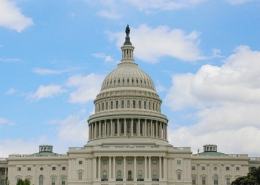In February, the Eno Center for Transportation and the Information Technology and Innovation Foundation (ITIF) published a report that examined the proceedings of the March 2020 spectrum auction that led to radio altimeter interference concerns from the aviation industry. As the use of 5G millimeter wave technology was set to begin in January of 2022, the Federal Aviation Administration (FAA) warned that, without changes to the rollout, it would ground planes around the country due to safety concerns. The report outlined recommendations that would help fill the gaps in the spectrum allocation process and prevent future process failures.
Eventually, the aviation and telecommunications industries came to an agreement that would delay the rollout and require the retrofit of less-interference-resilient radio altimeters to a more resilient model by July 1, 2023. The industry has not been able to meet this deadline due to supply chain and certification challenges, but they continue to work diligently to retrofit the remaining altimeters.
Last week, U.S. Secretary of Transportation Pete Buttigieg warned of flight delays as the industry struggles to meet this deadline. As reported in the Wall Street Journal, more than 80% of the domestic fleet and about 65% of international aircraft that fly into U.S. airports have radio altimeters that won’t be susceptible to interference from 5G signals. The remaining planes with less-resilient radio altimeters will not be able to land at many U.S. airports in low-visibility conditions. Airlines are adapting by scheduling these planes for airports that are less likely to be affected by weather events, and impact will likely be minimal.
Since the Eno/ITIF report was published, draft FAA and FCC reauthorization bills have been introduced in the House. Many of the recommendations outlined by the report have not been included in this proposed legislation, leaving the spectrum allocation process in the United States susceptible to future calamity. Here’s what has been included:
- The Securing Growth in Robust Leadership in American AviationAct (H.R. 3935) as approved by the House Transportation and Infrastructure Committee, would require the FAA to commission the National Academies to conduct a study of potential conflicts between the uses of radio spectrum by the aviation industry and telecommunication industries. (Section 532)
- An amendment successfully added to H.R. 3935 by Rep. Babin (R-TX) directs the FAA to carry out an accelerated program to assist with the development, testing, and certification of the standards and technology necessary to produce and certify the next generation of radio altimeters.
- The Spectrum Relocation Enhancement Act (H.R. 3430) as introduced by Rep. Matsui (D-CA) would amend the National Telecommunications and Information Organization Act to help facilitate the relocation of spectrum users and broaden the scope of the spectrum reallocation fund.
- The Spectrum Coexistence Act (H.R. 3431), also introduced by Matsui, would establish a working group through the Department of Commerce with the purpose of encouraging the design, manufacture, and sale of radio receivers operating in federal systems that incorporate appropriate measures to provide interference immunity.
- The FAA Research and Development Act of 2023 (H.R. 3559) as proposed by Rep. Lucas (R-OK) instructs the FAA to conduct research related to the effective and efficient use and management of radio frequency spectrum in the civil aviation domain (Section 211).
These proposed provisions are a big step in the right direction addressing the biggest recommendation from our report: to improve spectrum using devices’ resiliency to interference. They do not, however, address the need for investment in personnel that can properly operate and lead complex spectrum allocation processes, the need for independent research to settle spectrum disputes, and the need for the federal government to clarify and enforce jurisdictions and areas of expertise within the spectrum allocation process. More details on recommendations for meeting these needs can be found here.
While the impact to flight operations after July 1 will likely be limited, vulnerabilities remain in the spectrum allocation process that could lead to future disruptions in both the aviation and telecommunications industries. It is much too late for these legislative proposals to prevent any flight delays that may result after July 1. However, it is critical that Congress close these gaps to ensure safe and reliable transportation and communication networks in the United States.













